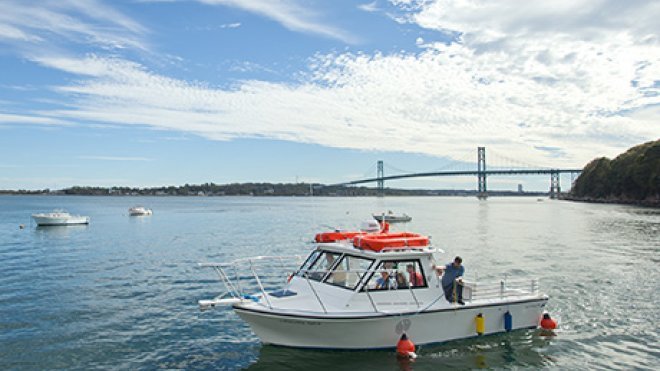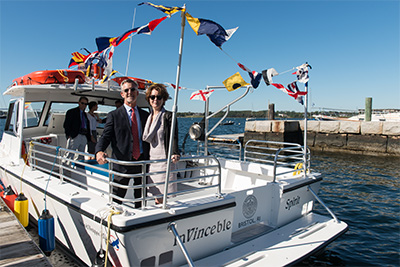RWU Receives NSF Grant to Launch New Experiential Learning Research Vessel
The research vessel will enable even more hands-on research collaborations among faculty and students that aim to improve the local and global marine industry

BRISTOL, R.I. – With a grant from the National Science Foundation (NSF), Roger Williams University launched a new research vessel this week that will be a vital resource for increased experiential learning opportunities and important research that contributes to the understanding of coastal ecosystem dynamics and the local and global marine industry.
RWU received a $158,449 award from the NSF’s Improvements in Facilities, Communications, and Equipment at Biological Field Stations and Marine Laboratories program to obtain a 30-foot research vessel that will significantly expand field research capacity for both faculty and students. And thanks to a generous donation from an alumnus, the vessel was outfitted for coastal research with cutting-edge sampling, safety and navigation equipment.
It’s a testament, says RWU President Donald J. Farish, to the strength of the university’s marine sciences program, where undergraduate students collaborate with faculty experts on research that informs the broader marine science community, that the NSF awarded a grant to enable the expansion of these educational and research opportunities.
“This research vessel will allow our very solid program in marine biology to do even more than they have been able to do in the past,” Farish said during the vessel’s dedication celebration at Herreshoff Marine Museum & America’s Cup Hall of Fame in Bristol. Being able to conduct hands-on research “is an important part of our educational mission.”
As a university dedicated to strengthening society through engaged teaching and learning, faculty and student researchers will use the new research vessel to contribute toward that greater good in many ways. It will be operated through the university’s Center for Environmental and Economic Development, whose mission enables research-driven learning opportunities that aim to develop economic and environmental solutions for the local and global marine industry. Just in the past six months, CEED has established a new partnership to build an ornamental fish hatchery in the Dominican Republic, entered into a statewide coastal ecology research consortium, collaborated on a $3 million, multi-university NSF grant investigating aquatic viruses, and had one of its marine experts named Aquarist of the Year.
“This is our first professional research vessel and it will greatly enhance the work we do, make it more efficient and research-focused,” said CEED Director Timothy Scott. “It will expand our capabilities both scientifically and by increasing exposure to field science for our students. And it will change the dynamic of our laboratory classes now that we have the ability to take out an entire class at once.”
In order to maximize use of the boat, it received Coast Guard documentation and was constructed to high safety standards that allows for upwards of 22 students for onboard lessons and to work on research projects. A diesel-powered, turbo-charged engine will significantly extend the faculty and student researchers’ range and time out on the water than they’ve had in the past.
The vessel was outfitted with many features like a hydraulic davit that will submerge and retrieve equipment from the water and place it on the boat; a dive platform; towing capacity that will allow for otter trawling, an important learning tool for marine biology students; and a state-of-the-art electronics package including sonar, plotter and radar.

A member of one of the first graduating classes of Roger Williams’ nascent marine biology program, Bill Geraghty ’78 – whose donation helped outfit the vessel for coastal research – recalls how much he enjoyed the days of wading into the bay to collect algae samples and bringing back specimens to examine in the lab. Although he went on to pursue an outstanding career in the financial services industry and now works as managing director at Ameriprise Financial, Geraghty continued to cultivate his love for RWU’s marine biology program and returned frequently to support and participate in many initiatives.
Each year that the Oyster Gardening for Restoration and Enhancement (OGRE) program released seedlings into the bay, he was there to send the tiny oysters off himself – and was the person responsible for bringing the seedling of a program idea to the university. He established the Mark Gould Memorial Scholarship in honor of his beloved mentor and professor. When he funded the construction of an observation lobby to view the inner workings of the shellfish hatchery and greenhouse, he dedicated it to the “Lobster Mortarboard Society” – his fellow marine bio graduates who adorned their caps with lobsters for the ’78 Commencement ceremony.
It was only fitting that Geraghty received the honor of naming the new research vessel. Called the InVinceble Spirit, he dedicated it to his father, Vincent, who instilled his love for the sea and sailing, and to the spirit of his alma mater.
“Spirit is something I feel as soon as I step on campus,” Geraghty said. “It’s a feeling I get from students, faculty, staff and administrators – all of the people who fuel this place with energy. That spirit is not just in the people at the school – it’s in the very ground the school is built on, it’s in the waters that surround the school. Perhaps it’s something left behind by the Pokanokets who inhabited the area because they had a spiritual reverence for their environment and they knew how to live in harmony, sustainably with their natural world. And that spirit is at the core of the marine biology program today, and I feel that school spirit to be invincible.”
That spirit and love of learning will continue to thrive in future generations of student researchers of all kinds at Roger Williams. Although the natural sciences programs will be the primary users of the vessel, Scott envisions this resource serving the entire campus community, providing learning opportunities for other academic areas such as the ability to take out an engineering class to study the Mount Hope Bridge.